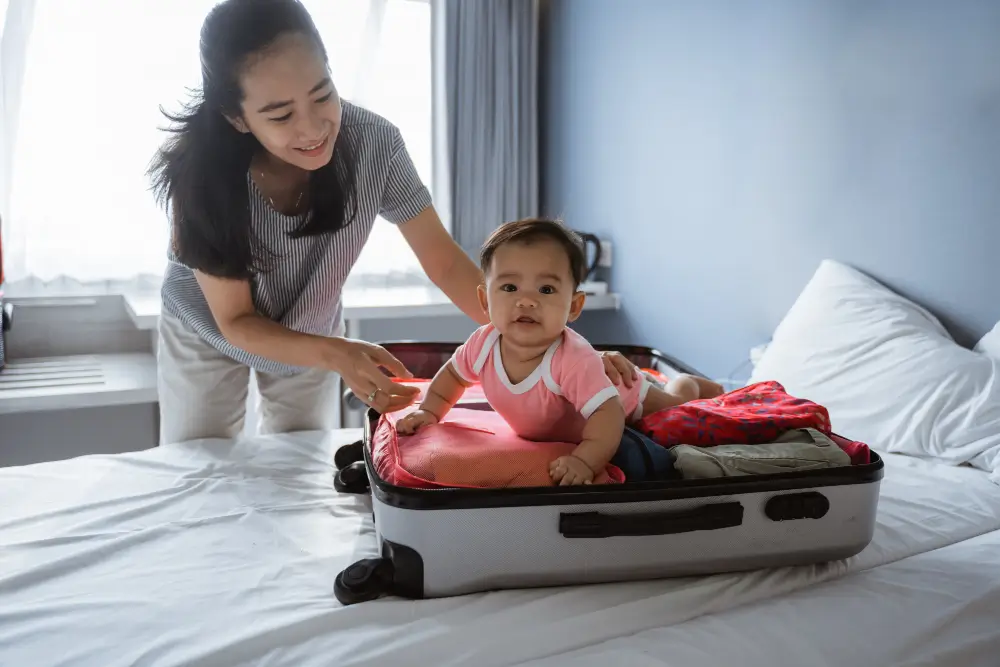
Introduction
The moment you hold your baby in your arms after surrogacy is one you’ll never forget. But for many intended parents—especially those from outside Canada—questions quickly follow:
- How do we get our baby’s birth certificate?
- When can we apply for a passport?
- Will our home country recognize us as the legal parents?
Canada’s surrogacy process is designed to protect both surrogates and intended parents, but it requires navigating several legal and administrative steps before you can take your baby home. This guide walks you through the process clearly, step by step.
Step 1 – Birth and Registration
Once your baby is born, the surrogate is initially listed as the birth mother on the hospital’s registration form. This is a standard practice across provinces and does not impact your ability to be recognized as the parents.
Within a few days, the birth is registered with the provincial Vital Statistics office.
Step 2 – Parentage Declaration
The next step is to legally transfer parentage from the surrogate to the intended parents.
- In Ontario and BC, parentage can often be declared immediately or within weeks if a written surrogacy agreement exists.
- In Quebec, reforms now allow parentage recognition, but the process may take longer.
- In other provinces, a court order may be required.
This declaration is crucial for issuing a new birth certificate listing the intended parents as the child’s legal parents.
💡 Expert Quote:
“Parentage orders are the bridge between birth registration and full parental rights. Without them, travel and citizenship applications cannot move forward.” – Dr. Kulsoom Baloch
Step 3 – Birth Certificate
Once the court grants parentage, the provincial authority issues a new birth certificate. This replaces the surrogate’s name with the intended parents’ names.
- Processing time: usually 2–6 weeks.
- This document is required to apply for citizenship or a passport.
Step 4 – Citizenship or Passport Application
For Canadian intended parents:
- If at least one parent is a Canadian citizen, the baby automatically inherits citizenship. Parents can apply for a passport immediately.
For international intended parents:
- The baby is a Canadian citizen by birthright.
- Apply for a Canadian passport at Passport Canada.
- You may also need to apply for your home country’s recognition of parentage or dual citizenship.
Step 5 – Travel Documents and Departure
With a Canadian passport or emergency travel certificate, parents can book flights home.
Plan for:
- 8–12 weeks in Canada after birth for paperwork (sometimes less in Ontario/BC).
- Extra time if your home country requires additional documentation.
Case Study – Michael and Sara’s Journey
Michael & Sara, Intended Parents from New York
After years of infertility, Michael and Sara chose surrogacy in Ontario. Their surrogate delivered a healthy baby girl in Toronto.
- Birth was registered with Ontario Vital Statistics.
- Within three weeks, they obtained a parentage order.
- A new birth certificate was issued in both their names.
- They applied for a Canadian passport and received it within 12 business days.
“We stayed in Canada for just under two months, but every step was worth it. Walking through U.S. customs with our daughter as her legal parents was a moment of triumph.” – Michael & Sara
Testimonials
“We planned for three months in Canada but were home in eight weeks. The legal team made it seamless.” – Raj & Priya, India
“Our lawyer in BC expedited the parentage order. The passport was issued quickly.” – Luis & Maria, Mexico
“We were nervous about our country recognizing surrogacy, but Surrogacy4All connected us with the right legal advisors.” – Anna & James, Australia
Internal Linking Suggestions
- Canadian Citizenship for Babies Born via Surrogacy
- Legal Guide to Surrogacy Contracts in Canada
- Is Surrogacy Legal in My Province?
FAQs
Q: How long must we stay in Canada after the birth?
Ans: Plan for 8–12 weeks, though Ontario/BC cases can be quicker.
Q: What if my home country doesn’t recognize surrogacy?
Ans: You may need to apply for adoption or citizenship through descent. Legal guidance is vital.
Q: Can both intended parents be on the birth certificate?
Ans: Yes, in most provinces, if a surrogacy agreement exists.
Q: Does the baby automatically get Canadian citizenship?
Ans: Yes, by birth, unless the parents are foreign diplomats.
Next Steps with Surrogacy4All
Bringing your baby home is a journey filled with excitement and paperwork. At Surrogacy4All, we walk with you through every legal, medical, and emotional step, ensuring your path home is smooth and joyful.
👉 Apply Now 📞 Call 1-212-661-7177 📧 Email info@surrogacy4all.com

Dr. Kulsoom Baloch
Dr. Kulsoom Baloch is a dedicated donor coordinator at Egg Donors, leveraging her extensive background in medicine and public health. She holds an MBBS from Ziauddin University, Pakistan, and an MPH from Hofstra University, New York. With three years of clinical experience at prominent hospitals in Karachi, Pakistan, Dr. Baloch has honed her skills in patient care and medical research.





